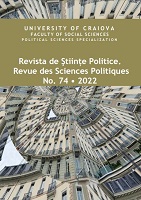The Impact of the Proportional Electoral System on Government Stability: Cases of Kosovo and North Macedonia
The Impact of the Proportional Electoral System on Government Stability: Cases of Kosovo and North Macedonia
Author(s): Lundrim Aliu, Jonuz AbdullaiSubject(s): Government/Political systems, Electoral systems
Published by: Editura Universitaria Craiova
Keywords: Democracy; proportional electoral system; government instability; Kosovo; North Macedonia;
Summary/Abstract: Government instability, or the duration of a government cabinet, is considered an important feature of democracy, and various authors have studied various alleged causes that affect government instability. This paper examines the impact that the electoral system - the way in which votes casted in national elections are translated into seats in the parliament - has on the instability of government in a democracy. Particularly, it examines the impact of the proportional electoral system on the instability of governments since governments formed in countries with this electoral system, in vast majority of cases, are coalition governments, with different parties, governance and legislative inefficiency due to internal conflicts and the continuing need for consensus. To examine the relationship between the proportional electoral system and government instability, the research for this paper employs different research methods. Following a literature review on the topic, it then focuses on comparative method where the cases of the impact of the electoral system on government stability in Kosovo and in North Macedonia, two neighbors in Southeast Europe with similar electoral system, size of population and number of registered voters, are examined and compared. The electoral system in both Kosovo and North Macedonia is a proportional system (List-PR). Kosovo had 7 different governments in 15 years, and North Macedonia had 10 different governments (including here 2 interim governments) in 20 years. These two cases confirm a correlation between the proportional electoral system that has always produced coalition governments in both countries, and the short duration of the two countries' governments.
Journal: Revista de Științe Politice. Revue des Sciences Politiques
- Issue Year: 2022
- Issue No: 74
- Page Range: 64-72
- Page Count: 9
- Language: English

